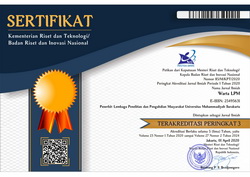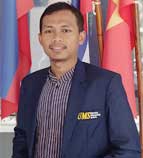Penguatan Pembekalan Kemampuan Pemrograman Dasar bagi Pelajar Sekolah Menengah Umum
DOI:
https://doi.org/10.23917/warta.v26i1.1042Keywords:
bootcamp, python, ubaya global academy, programming languageAbstract
Basic programming training that teaches problem-solving logic has developed at all ages, from kindergarten, elementary school to higher education age. This happens because at this time, the concept of computing or informatics thinking has been considered to be a basic requirement in everyday life. Various forms of learning the concept of informatics thinking, are designed according to the user's age group so that users can enjoy it. In the community service activities carried out this time, the target of basic programming training is Public High School students, which are open to all schools in Indonesia. This activity was implemented during the Covid-19 pandemic, so this activity was carried out online in the form of a bootcamp through the Zoom meeting application regularly in one month, which was led as a team by a lecturer and several teaching assistants. This training does not stop at delivering material and demonstrations from lecturers but also training assistance conducted by teaching assistants. The material in this training uses the Python programming language. Python was chosen to be used in the training, because currently Python is a programming language that is widely used for simple to complex programming such as data mining and machine learning. Participants can access training materials through the Learning Management System created by Universitas Surabaya to support the dissemination of knowledge to the wider community through the Ubaya Global Academy) platform. Based on the evaluation of the activities carried out before and after the activity was carried out, this activity is considered to provide benefits and can be carried out regularly every year and has follow-up classes.
Downloads
References
Alhazzani, N. (2020). MOOC’s impact on higher education. Social Sciences & Humanities Open, 2(1), 100030. https://doi.org/10.1016/j.ssaho.2020.100030
Foundation, P. S. (2022). Python. https://www.python.org/
Garcia-loro, F., Martin, S., Ruip, A., & Castro, M. (2020). Computers & Education Reviewing and analyzing peer review Inter-Rater Reliability in a MOOC platform. 154(April). https://doi.org/10.1016/j.compedu.2020.103894
Hill, C. (2020). Learning Scientific Programming with Python. CAMBRIDGE UNIVERSITY PRESS. https://scipython.com/book/
Ika. (2020). Membedah Tantangan Pembelajaran Daring di Tengah Pandemi Covid-19. https://ugm.ac.id/id/berita/19552-membedah-tantangan-pembelajaran-daring-di-tengah-pandemi-covid-19
ILO. (2020). Rapid Assessment of Information and Communication Technology Skills Demands in Indonesia 2020. 1–6. https://www.ilo.org/jakarta/whatwedo/publications/WCMS_766461/lang--en/index.htm
Indonesia, S. (2022). LMS Perguruan Tinggi. https://spada.kemdikbud.go.id/course/lmspt.php
Kemdikbud. (2021). SEAMEO QITEP in Science Dukung Kompetensi Guru di Bidang Computational Thinking. https://www.kemdikbud.go.id/main/blog/2021/03/seameo-qitep-in-science-dukung-kompetensi-guru-di-bidang-computational-thinking
Kemenristekdikti. (2019). Statistik Pendidikan Tinggi (Higher Education Statistics) 2019. In Pusdatin Kemenristekdikti. http://www.mohe.gov.my/web_statistik/
Kumar, P., Kumar, A., Palvia, S., & Verma, S. (2019). Online business education research: Systematic analysis and a conceptual model. International Journal of Management Education, 17(1), 26–35. https://doi.org/10.1016/j.ijme.2018.11.002
Kurniasari, F., Jusuf, E., & Gunardi, A. (2018). The Readiness of Indonesian Toward MOOC System. International Journal of Engineering & Technology, 7(3), 1631-1636 International. https://doi.org/10.14419/ijet.v7i3.15431
Lambert, S. R. (2020). Do MOOCs contribute to student equity and social inclusion? A systematic review 2014–18. Computers and Education, 145(November 2018), 103693. https://doi.org/10.1016/j.compedu.2019.103693
Limanto, A., Khwarizma, A. F., Imelda, Rumagit, R. Y., Pietono, V. P., Halim, Y., & Liawatimena, S. (2017). A study of Information Technology Infrastructure Library (ITIL) framework implementation at the various business field in Indonesia. 2017 5th International Conference on Cyber and IT Service Management, CITSM 2017, 1–4. https://doi.org/10.1109/CITSM.2017.8089244
Lutfina, E., & Wardhani, A. K. (2020). Pengenalan Dan Pelatihan Pemrograman Berbasis Blok Bagi Anak. Magistrorum et Scholarium: Jurnal Pengabdian Masyarakat, 1(1), 107–111. https://doi.org/10.24246/jms.v1i12020p107-111
PDDikti. (2020a). Higher Education Statistics 2020. https://pddikti.kemdikbud.go.id/publikasi
PDDikti. (2020b). Pangkalan Data Pendidikan Tinggi. pddikti.kemdikbud.go.id
Pradana, A. A., Casman, & Nur’aini. (2020). Pengaruh Kebijakan Social Distancing pada Wabah COVID-19 terhadap Kelompok Rentan di Indonesia. Jurnal Kebijakan Kesehatan Indonesia?: JKKI, 9(2), 61–67. https://jurnal.ugm.ac.id/jkki/article/view/55575
Raschka, S., Patterson, J., & Nolet, C. (2020). Machine learning in python: Main developments and technology trends in data science, machine learning, and artificial intelligence. Information (Switzerland), 11(4). https://doi.org/10.3390/info11040193
Report, D., & Profiles, O. (2018). Indonesia ’ s Critical Occupations List. November.
Santoso, H. B., & Hutabarat, P. (2018). Akselerasi E-Learning dan Online Education di Tanah Air. https://www.cs.ui.ac.id/index.php/akselerasi-e-learning-dan-online-education-di-tanah-air/
Setyowati, W., Widayanti, R., & Supriyanti, D. (2021). Implementation Of E-Business Information System In Indonesia?: Prospects And Challenges. International Journal of Cyber and IT Service Management, 1(2), 180–188. https://doi.org/10.34306/ijcitsm.v1i2.49
South, L., Saffo, D., Vitek, O., Dunne, C., & Borkin, M. A. (2022). Effective Use of Likert Scales in Visualization Evaluations: A Systematic Review. Computer Graphics Forum, 41(3), 43–55. https://doi.org/10.1111/cgf.14521
World Bank. (2018). Preparing ICT skills for digital economy: Indonesia within the ASEAN context. Https://Blogs.Worldbank.Org/Sites/Default/Files/Preparing_Ict_Skills_for_Digital_Economy-Revised_7Mar2018.Pdf, 1–32.
World Bank Group, Kementerian PPN/Bappenas, & Australian Government. (2020). Indonesia’s Occupational Employment Outlook - 2020 Technical Report. 1–97. https://www.bappenas.go.id/files/4916/2304/8835/Occupational_Employment_Outlook_TREnglish.pdf
Yamali, F. R., & Putri, R. N. (2020). Dampak Covid-19 Terhadap Ekonomi Indonesia. Ekonomis: Journal of Economics and Business, 4(2), 384. https://doi.org/10.33087/ekonomis.v4i2.179
Yanti, B., Wahyudi, E., Wahiduddin, W., Novika, R. G. H., Arina, Y. M. D., Martani, N. S., & Nawan, N. (2020). Community Knowledge, Attitudes, and Behavior Towards Social Distancing Policy As Prevention Transmission of Covid-19 in Indonesia. Jurnal Administrasi Kesehatan Indonesia, 8(2), 4. https://doi.org/10.20473/jaki.v8i2.2020.4-14
Downloads
Submitted
Accepted
Published
How to Cite
Issue
Section
License
Copyright (c) 2023 Warta LPM

This work is licensed under a Creative Commons Attribution 4.0 International License.















